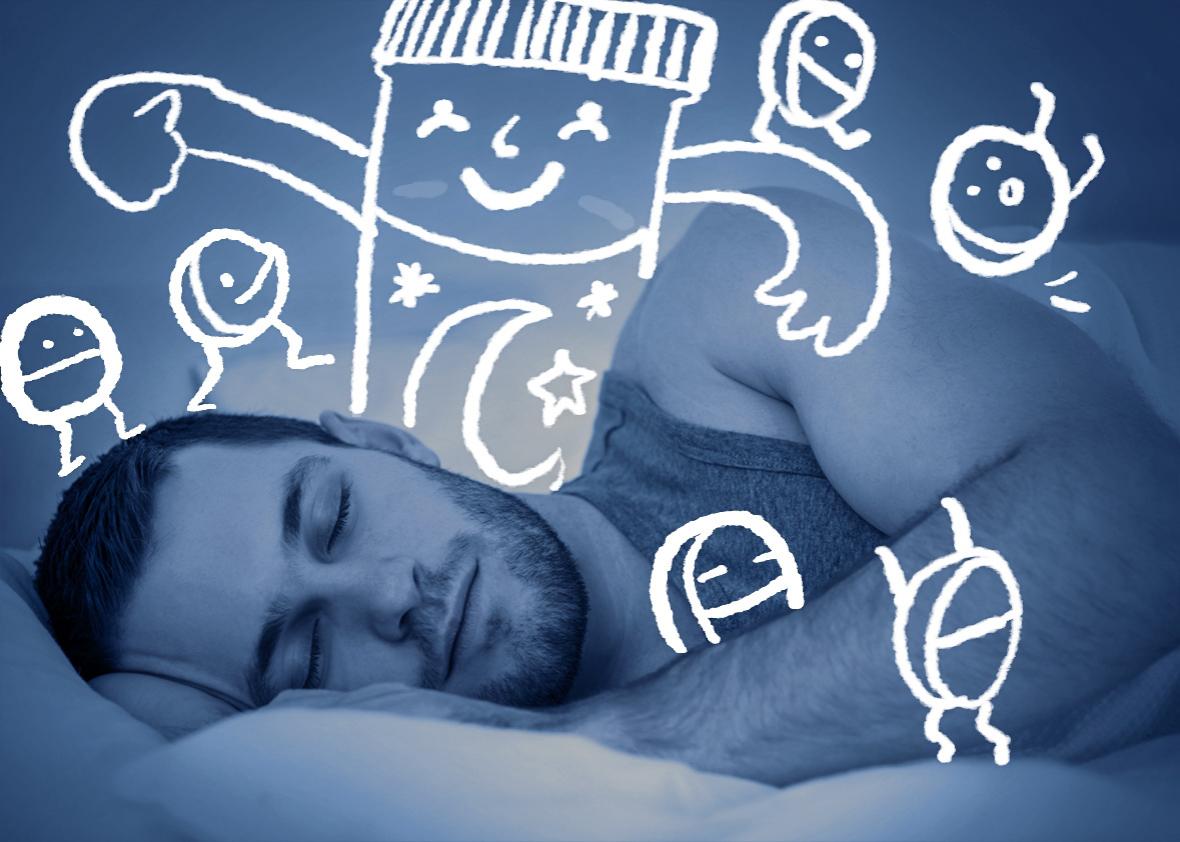Why did Slate start a sleep blog? Find out here.
Falling asleep is hard work. After spending a day solving the complex puzzles of daily life, you are expected to lie down, turn off the lights, and quiet your whirring whirlwind of thoughts within a few minutes. In my early years, this process was fraught with frustration and despair: I would lie awake for hours, bored and desperate, staring at the ceiling, wondering why I couldn’t shut off my brain. I tried all the hippie methods—meditation, breathing exercises, even goddamn Sleepytime tea—but none of it eased me into slumber.
Then, around age 15, I discovered melatonin. I first spotted the drug on the shelf of a health food store—the kind that sells vegan dog food and horny goat weed. Melatonin struck me as marginally less scammy than most supplements, so I bought a bottle and took my first dose that night. Thirty minutes later, I was overcome with the drowsy feeling kids get after a day at the beach. Five minutes after that, I eased into sleep.
And that’s when the real fun began.
There is a fair amount of research documenting the effectiveness of melatonin supplements as a sleep aid. But there is relatively little research to explain why it gives you trippy, totally bonkers dreams. This phenomenon is well-documented on the Internet but largely ignored by scientists, presumably because crazy dreams are not (yet) therapeutically relevant. Still, almost everybody I know who takes melatonin confirmed what I discovered on that first night: You will never dream as vividly as you do on melatonin.
These dreams, I should note, are not just normal dreams kicked up a few notches in intensity. They are a different type of dream—more akin (I am told) to a lysergic hallucination than a typical oneiric vision. My melatonin dreams are bursts of energy and excitement: sometimes fast-paced and fragmented, sometimes lucid and evocative. I have woken up from a melatonin dream with a deeper understanding of a friend or family member, or a great insight into a persistent problem, or that relieved, glazed sensation of stepping off a roller coaster. I wake up feeling refreshed, with yesterday’s thoughts neatly compressed, sorted, and filed away.
Why does this happen? Nobody really knows. Melatonin’s basic mechanism is simple: The brain’s pineal gland naturally secretes melatonin, a hormone, when darkness falls—signaling to the body that it’s time to sleep. Melatonin supplements mimic this process, tricking the brain into thinking it’s bedtime. They also help regulate our circadian rhythm, the internal clock that tells us when to sleep and when to wake up. Switching time zones and consuming caffeine can seriously disrupt these rhythms, and some people are just cursed with a faulty body clock. Melatonin supplements keep circadian rhythms healthy and regular. Our natural supply of melatonin may also diminish as we age, a problem supplements can help reverse.
But what about those nutty dreams? At least one study has tentatively confirmed that melatonin increases “dream bizarreness”—especially in women, who may remember their dreams better than men. Researchers speculate that melatonin contributes to the quality and quantity of REM sleep, when most dreams occur. Taking extra melatonin, then, could kick our REM cycle into hyperdrive, giving us longer, richer, more memorable dreams.
Before you rush off to melatonin dreamland, a few caveats: The supplement is extremely safe in the short term, but its long-term effects are basically unknown. The usual dose—1 to 3 mg—can be multiplied exponentially with no apparent side effects. (That dream bizarreness study gave participants a whopping 250 mg dose and reported no issues.) But no longitudinal study has yet confirmed that melatonin supplements are completely safe to take for years. The fear here is that melatonin supplements could somehow diminish our brain’s natural supply of the hormone, getting us hooked on the pills for sleep. There is also some very tentative research showing that the positive effects may peter off after a few months of use.
But that doesn’t square with my experience: The stuff still works gangbusters for me nine years into my experiment. And when I absentmindedly miss a dose, I don’t lie awake in restless agony: At most, my sleep is marginally less satisfying. If I ever do feel hooked on melatonin, I’ll probably feel compelled to quit. Until then—or until my wild dreams turn pedestrian—I’m happy to keep playing human guinea pig.
Read more from The Drift, Slate’s pop-up blog about sleep.
